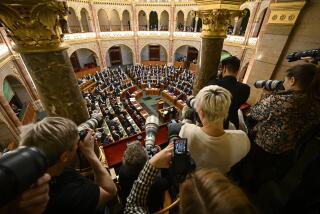Czech Senate backs U.S. antimissile plan
PRAGUE, CZECH REPUBLIC — The upper chamber of the Czech Parliament on Thursday approved a deal with Washington to accept a U.S. missile defense installation.
The deal still needs the approval of the lower chamber, where the vote is expected to be close because the governing coalition has too few seats to guarantee passage. The vote there is not expected before the end of the year.
The proposed missile defense system calls for a tracking radar in the Czech Republic and 10 interceptor missiles in Poland as part of a shield designed to protect the region from possible attacks from Iran.
The Czech Senate approved the two treaties involved in the deal: the main bilateral agreement allowing the United States to build a radar base near Prague and a complementary pact that deals with the legal status of U.S. soldiers to be deployed at the base.
“It is good news for us, Europe and our NATO allies,” Foreign Minister Karel Schwarzenberg said.
For each treaty, 49 senators voted in favor and 31 voted against.
Parliamentary ratification is also needed in Poland.
Russia is fiercely opposed to the plans, saying U.S. military installations in former Soviet satellites threaten its security.
It recently threatened to install short-range missiles close to European Union borders in response to the U.S. plans. Russian President Dmitry Medvedev later suggested that, if Washington were to halt its plans, Russia would do the same.
The administration of President-elect Barack Obama has not commented on the deals, brokered under President Bush.
Most Czech opposition parties are against the missile defense plan and demand a nationwide referendum on the issue.
Jan Tamas, an organizer of numerous public protests against the radar, called Thursday’s vote “a major setback.”
“I believe this day will be remembered as Black Thursday in the history in our country,” he said.
More to Read
Sign up for Essential California
The most important California stories and recommendations in your inbox every morning.
You may occasionally receive promotional content from the Los Angeles Times.










